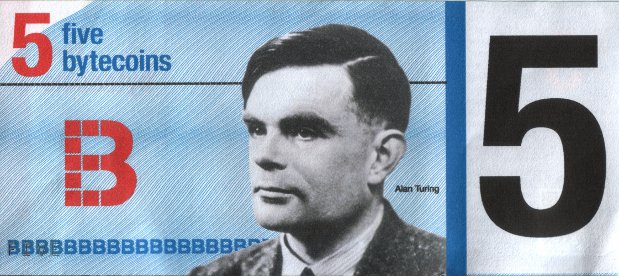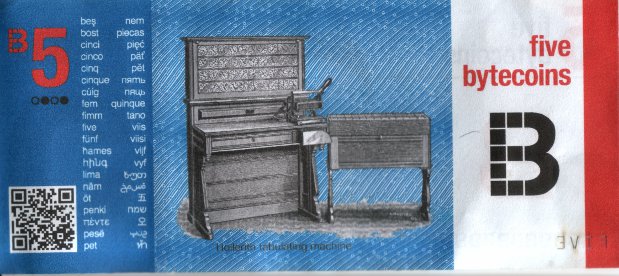July 2-5, 2011
While bitcoins are getting a lot of press, I thought I would pimp an even newer currency that has been circulating through the Seattle Hacker scene. Bytecoin [1], not to be confused with Bitbills [2] or Bitcoins [3] are a paper currency with no crypto security features. That means that in order to counterfeit a bytecoin, you simply need to copy it perfectly. On the other hand, bytecoins are cool, pretty, and worth the paper and ink they are printed on. Being real-world counts for something. I procured a sample and scanned it with my old scanner and made a 1450 dpi copy of the front and back of the 5 bytecoin to show the craftmanship of the bill. Of course, with a decent printer, you could use this image to counterfeit the currency as well. Time will tell whether bytecoins become worthy of counterfeiting, but I feel that the currency is worth something. The fact that I am posting hi-res scans means that the bytecoin is worth something to me. I am grateful to the author who was willing to let me post these scans.
Read more »For your eyes only.
Nov 16 a guitar high
Nov 16 b guitar low
Nov 16 c bass
Nov 16 d piano
Nov 12, 2010
If you haven't heard yet, Dan Kaminsky released Phreebird-1.0 yesterday at Blackhat Abu Dhabi. It is beta software that is designed to allow a DNS admin to setup DNSSEC in less than an hour. In my experience, setting up Phreebird on my system has taken less than an hour but has shown how awful the software is. It is not ready for prime time and it definitely has a lot of little work ahead of it. One might even question whether we should trust a security researcher to write good code. As a security researcher who puts great care into the software I write, I will most certainly say that security researchers are the perfect people to write code. We understand what needs to be done and "real" programmers can always make it better once we've got it working right. And when "real" programmers make mistakes, we can always crash their code.
The tarball is awful. Has no one ever taught Dan Kaminsky how to tar a package for worldwide distribution? Anyway, minor gripe.
Read more »
Nov 2, 2010
You may be aware of my work on RockBand 2 Drum "drivers". If I had written my code as a kernel module (and it would likely be accepted into the mainline), it would be easy to call it a driver. However, I wrote it using libusb and ALSA, which makes it a userland program. I feel that I made the right design choice. ALSA libraries are low enough latency and libusb allows efficient use of interrupts, so it works quite well. Also, adding any complex code to the kernel that isn't totally necessary seems like a risky endeavor.
Anyway, that code is here: RockBand 2 Drum Instrument for Linux
Read more »




